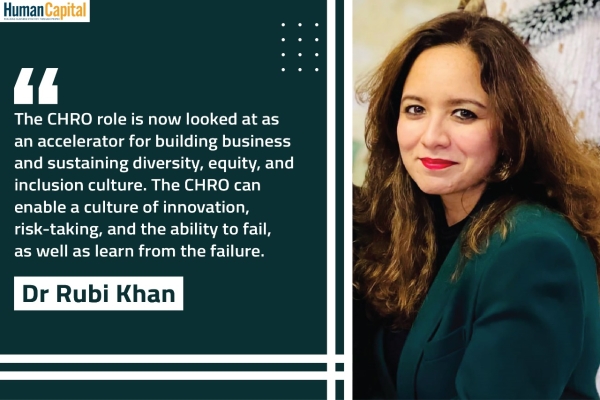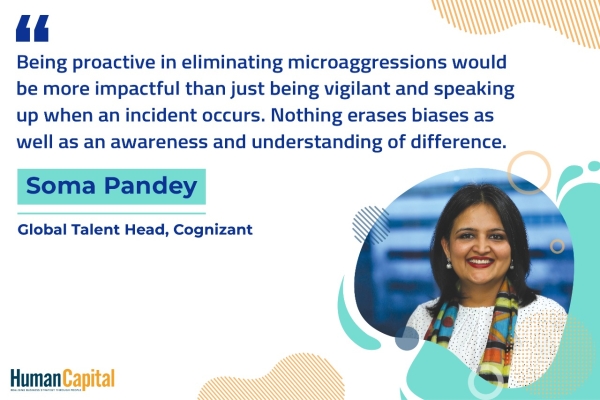The pandemic has tested us as leaders. We have had to deal with novel leadership challenges, make difficult choices that we were not prepared for, and balance the safety and well-being of our employees with the medium- to long-term impact on the sustainability of our businesses.
As Klaus Schwab, Founder and Executive Chairman, World Economic Forum, said: “The pandemic represents a rare but narrow window of opportunity to reflect, reimagine, and reset our world.” This statement applies to organisations, businesses, leaders, and possibly to all of us as individuals.
The pandemic has tested us as leaders. We have had to deal with novel leadership challenges, make difficult choices that we were not prepared for, and balance the safety and well-being of our employees with the medium- to long-term impact on the sustainability of our businesses. How we showed up as leaders for our organisations and teams during these difficult times really mattered.
For me, leading teams over the past year challenged many of my assumptions about how things work. I learned to:
• find equilibrium while operating in contradictions;
• be pragmatic about the current reality and balance it with hope and optimism while communicating with teams;
• balance the need to solve the most pressing challenges of the present while planning for an uncertain future;
• portray confidence and attempt to provide clarity when the team needed reassurance whilst being vulnerable and honest in accepting that I do not have all the answers; and
• embrace technology in this remote way of working while maintaining the humanness of my interactions.
Early in my career, the term “soft skills” was used to explain character traits, behaviours, and interpersonal skills that helped leaders succeed at senior levels. I have never liked that term. As Josh Bersin says, “Hard Skills are soft (they change all the time, are constantly being obsoleted, and are relatively easy to learn), and Soft Skills are hard (they are difficult to build, critical, and take extreme effort to obtain).” The past year has not only brought soft skills to the forefront more than ever before but their relative importance for leaders’ success has also been recalibrated.
Leadership has been disrupted, and below are five skills that I predict will become even more important for leaders in the new normal. These skills and behaviours will no longer be seen as peripheral but rather core to modern leadership.
1. Navigating Paradoxes
As leaders, we need to acknowledge that paradoxes exist and learn to be comfortable in navigating them. As we operate in contradictions, we also need to ensure that they do not generate too much friction in our minds. Having a frictionless mind does not mean that we should not have a point of view or strong convictions based on experiences and logic. It means having the willingness to relinquish our beliefs and assumptions, adopt other perspectives, and question the validity of our underlying thinking. And for that, we need to be intensely self-aware and willing to confront our own biases and blind spots.
Ask yourself: What are the biggest contradictory demands of my role? Am I able to embrace paradoxes as a leader and find a balance?
2. Leading with Empathy
There was a time when collective wisdom suggested that there was no place for feelings and emotions in the workplace. However, the need for leaders to be empathetic has come sharply into focus the past year. Empathetic leadership is about listening actively with an open mind, responding to team members’ needs, and communicating transparently. Listening actively also entails not making assumptions about what we believe people want but truly understanding their preferences and needs based on their unique individual circumstances.
Ask yourself: Am I showing care and concern not just about the work but about how my team members are doing? Am I treating them the way they want to be treated, rather than the way I think they want to be treated?
3. Intentional Inclusion
In the current model of remote working and the potential hybrid workforce model of the future, intentional inclusion is imperative. All teams have non-inclusive dynamics, and while working in a remote context, these dynamics can become amplified without targeted interventions. Organisations establish systematic mechanisms for inclusion, but an inclusive environment is created more by leaders, who, through their behaviour, make conscious inclusion a daily practice for the teams they lead and are a part of. Being inclusive is also about creating and harvesting disparate perspectives in the team to arrive at the best solution and ensuring people feel seen and heard.
Ask yourself: How do I build a sense of community within the new virtual culture? How do I establish “standards of team engagement” that facilitate inclusion for all my team members? How do I bring everyone into the conversation, especially those who are new or less comfortable speaking up or sharing their opinions?
4. Resilience
The year 2020 brought so much change, so many setbacks, and even much loss to people in their personal and professional lives. As leaders, our personal ability to cope with uncertainty and keep persevering for what is important has become a critical skill. This means pausing to assess, giving ourselves and our teams the permission to try new things, and becoming comfortable with failure. How we respond to uncertainty also determines how our teams react — do they become paralysed by inaction, or do they unleash their creativity and innovation to emerge strongly from a crisis? Reinforcing the organisational purpose and keeping it as the true north helps teams build resilience during difficult times.
Ask yourself: What can I do as a leader to build resilience in my team? How do I help them navigate uncertainty and yet keep moving forward?
5. Authenticity
What teams need today is to feel the very essence of their leaders. In challenging times, the ability to show openness and vulnerability is critical for a leader. It allows team members to feel comfortable being open and share more of themselves, their motivations, and challenges. Vulnerability is often seen as a weakness, but this is not the time for us to pretend to be invincible. Showing up as a whole person, boldly sharing what we care about, and expressing our most authentic and deepest value system through what we say and do is critical in building trust.
Ask yourself: Have I shared how the crisis has personally affected me with my team? How do I make it psychologically safe for my teams to share?
A Few More Points to Ponder On
An additional aspect to reflect on as a leader is “self-care”. If we want our teams to take care of themselves, are we role-modelling that behaviour? Our ability to be present, handle business uncertainty, and deal with the emotions of our teams depends on our state of being. It is often said that you cannot pour from an empty vessel. So, attending to our own physical, mental, and emotional well-being is crucial to have the strongest impact on the teams we lead and serve.
Finally, as McKinsey’s recent article suggests, we need to be asking ourselves what we will look for differently in leaders as an outcome of what we have learned during this pandemic and what actions we will take so that these attributes can be hardwired into our model of developing leaders.
Do you look forward to permanently working from home after the pandemic subsides?
Trending
-
SBI General Insurance Launches Digital Health Campaign
-
CredR Rolls Out 'Life Happens' Leave For Its Employees
-
Meesho Announces 30-Week Gender-Neutral Parental Leave Policy
-
Microsoft Unveils Tech Resilience Curriculum To Foster An Inclusive Future
-
60% Indian Professionals Looking For Job Change Due To COVID: Survey
-
SpringPeople And Siemens Collaborate For Digital Transformation Push
-
86% Professionals Believe Hybrid Work Is Essential For Work Life Balance: Report
-
Almost 1 In Every 3 People's Personal Life Affected Due To Work Stress
-
Meesho Rolls Out Reset And Recharge Policy For Employees
-
80% Of Talent Leaders & Academics Say Pandemic Changed Skill Needs For Youth: Report
-
Hero Electric Rolls Out 'Hero Care' Program For Employees
-
Human Capital In Collaboration With ASSOCHAM Hosts Virtual Conference
-
IKEA India, Tata STRIVE Collaborate To Create Employability And Entrepreneurship Opportunities
-
SAP India, Microsoft Launch Tech Skilling Program for Young Women
-
DXC Technology, NASSCOM Collaborate For Employability Skills Program
-
Lenskart To Hire Over 2000 Employees Across India By 2022
-
Mindtree Launches Learn-and-Earn Program
-
Tata AIA Extends 'Raksha Ka Teeka' To Its Employees
-
Swadesh Behera Is The New CPO Of Titan
-
NetConnect Global Plans To Recruit 5000 Tech Professionals In India
-
Hubhopper Plans To Hire 60% Of Indian Podcasters By 2022
-
Corporate India Needs More Women In Leadership Roles: Report
-
Aon to Invest $30 Million and Create 10,000 Apprenticeships by 2030
-
Tech Mahindra Launches ‘Gift a Career’ Initiative for Upskilling of Youth
-
40% Women Prefer Flexible Working Options in Post-COVID World: Survey
-
3 out of 4 companies believe they can effectively hire employees virtually: Report
-
Vodafone , CGI and NASSCOM Foundation launch digital skills platform
-
Odisha: Bank, postal employees to deliver cash for elderly, differently-abled persons
-
Skill India launches AI-based digital platform for "Skilled Workforce"
-
Hiring activity declines 6.73% in first quarter: Survey
-
70% startups impacted by COVID-19 pandemic
-
Bajaj Allianz Life ropes in Santanu Banerjee as CHRO
-
Over 70 Percent MSMEs look at cutting jobs to sustain businesses
-
93 Per Cent employees stressed about returning to office post-lockdown
-
Johnson & Johnson India announces family benefits for same gender partners
-
Indian firms turning friendly towards working mothers
-
Welspun India names Rajendra Mehta as new CHRO
-
Wipro partners with NASSCOM to launch Future Skills platform



Human Capital is niche media organisation for HR and Corporate. Our aim is to create an outstanding user experience for all our clients, readers, employers and employees through inspiring, industry-leading content pieces in the form of case studies, analysis, expert reports, authored articles and blogs. We cover topics such as talent acquisition, learning and development, diversity and inclusion, leadership, compensation, recruitment and many more.
Subscribe Now












































Comment